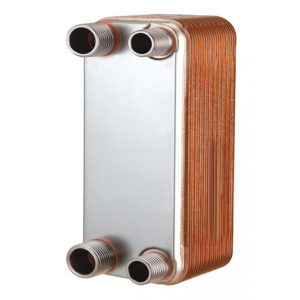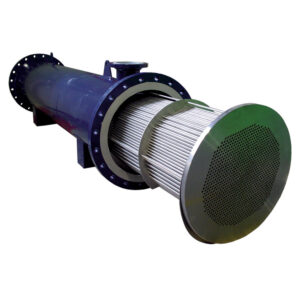API Energy Scraped Surface heat exchangers
API Energy Scraped Surface heat exchangers
API Energy Heat Exchangers designs and manufactures scraped surface heat exchangers for applications where either one or both of the following problems require special solutions. Fouling causes heat transfer rates to drop and viscous fluids having very low heat transfer rates.
Heat Exchanger Fouling
Fouling occurs when fluids degrade near the tube wall and layers of solids deposit or stick to the tube wall. These layers work as an insulator for heat transfer, causing performance to drop. Another form of fouling is crystallisation where, due to cooling or increasing concentration, components in the fluid change to the solid state and deposit on the heat exchanger surface.
To maintain heat transfer high these fouling layers need removal and that is where scraping of the heat transfer surface come in place.
VISCOUS FLUIDS
In general, the more viscous the fluid, the lower the heat transfer is. This means that very viscous fluids require a very large heat transfer area. Scraped surface heat exchangers mix the fluid vigorously, which helps to move the fluid to and from the heat exchange surface. This increases heat transfer rates, so the total area required for heat exchange is reduced.
In order to overcome excessive fouling and viscous API Energy Scraped Surface Heat Exchangers solutions have been developed for different types of applications.
Product Description
API Energy Scraped Surface Heat Exchanger are classified in two types based on movement of scraper rod.
- API Energy Rotating Scraped Surface Heat Exchangers
- API Energy Reciprocating Scraped Surface Heat Exchangers
API Energy Rotating Scraped Surface Heat Exchangers is a scraped surface heat exchanger designed for the most difficult heat transfer applications, for example where very high viscosities and highly fouling fluids need heat treatment.
API Energy Rotating Scraped Surface Heat Exchangers technology uses a rotary scraper rod. This scraper rod can reach very high levels of shear and mixing at the heat transfer surface; dramatically increasing the heat transfer rate. A spiral blade is fitted to the scraper rod. The rotating movement of this blade helps to push the fluid forward. This way, high viscous fluids are pumped through more easily resulting in less back pressure.This heat exchanger has been developed for both hygienic and industrial applications. Each inner tube contains a scraper bar fitted with a helical screw which rotates at high speed and enhances flow through the tube whilst reducing pressure drop. In addition, the continuous scraping action eliminates fouling on the inner tube wall, ensuring that the heat transfer area is clean at all times.API Energy Rotating Scraped Surface Heat Exchangers is fitted with removable inner tubes; ensuring easy inspection and maintenance. This significantly reduces operational costs.
API Energy Reciprocating Scraped Surface Heat Exchangers are suitable for heat transfer applications on a wide range of products and situations.
Products:
- Viscous food products: Dairy and vegetable concentrates (condensed milk, tomato paste, purees, juice concentrates, honey, butter, margarine)
- Convenience foods: Chocolate-based dressings, ketchup, cheese sauce, spreads
- Protein: Egg-based products, minced meats
- Cosmetics: Lotions, cream, gels
Processes:
- Heating
- Cooling
- Pasteurisation
- Crystallisation
- Evaporation
API Energy Reciprocating Scraped Surface Heat Exchangers is a scraped surface heat exchanger for high fouling and viscous fluid applications. It has been specially designed and developed to offer a solution for those difficult heat transfer applications where very viscous fluids are used or fouling appears.
The design is based on a traditional shell and tube heat exchanger with scraping elements inside each tube. The reciprocating movement of the scrapers mixes the fluid whilst cleaning the heat exchange surface. This keeps heat transfer high and reduces downtime. In addition, the scraping movements introduces turbulence in the fluid increasing levels of heat transfer.
This design of API Energy Reciprocating Scraped Surface Heat Exchangers makes the ideal heat exchanger for applications where fouling or low heat transfer is a limiting factor. It can be applied in industrial and hygienic applications.
The gentle movement of the scrapers allows the system to be used with delicate products, such as food products with whole fruit or vegetable pieces, without destroying the integrity of the product. By increasing the stroke speed of the scraper bar we have been able to increase the heat transfer rates considerably. The wide range of models available has made it possible to offer economic solutions for small to big duty applications. From food industry to environmental industry, from biomass to evaporation applications.
The scraping system consists of a stainless steel rod to which the scraping elements are fitted. It can handle materials such as Teflon and Peek (polyaryletheretherketone) are used. Scraping means fouling free heat transfer surfaces. No loss of heat transfer due to fouling.
Another advantage of the scraping action is the introduction of extra turbulence in the product. This results in a better transport of the product to and from the heat exchange surface which enhances heat transfer rates significantly.
API Energy Reciprocating Scraped Surface Heat Exchangers are suitable for heat transfer applications on a wide range of products and situations.
Products:
- Dairy: Cheese, yogurt, creams, desserts, whey concentrate, ice cream, condensed milk
- Fruits: Juice concentrate, fruit preparation, fruit puree, diced fruit
- Vegetables: Processed vegetables, tomato concentrate
- Convenience food: Eggs, mashed potatoes, ketchup, mayonnaise, baby food, dressings, spreads, fats, oils
- Protein: Viscera, meat slurry, mechanically deboned meat, meat stuffing, minced meat, pet food
- Confectionary: Chocolate, pie filling, creams, pastes, marmalade, syrups, gelatine, starch, butter, margarine
- Beverages: Coffee extract, juice freezing, juice concentrate, yeast-malt extracts
- Cosmetics: Lotion, cream, gel
- Environmental waste: Waste concentration: brine, manure, food plant effluent, chemical waste, solvent recovery
- Biofuels: Oil extraction for biodiesel, biomass pre-treatment, thermal hydrolysis, fermentation, digestate concentration
Processes:
- Heating
- Cooling
- Pasteurisation
- Crystallisation
- Evaporation








Reviews
There are no reviews yet.